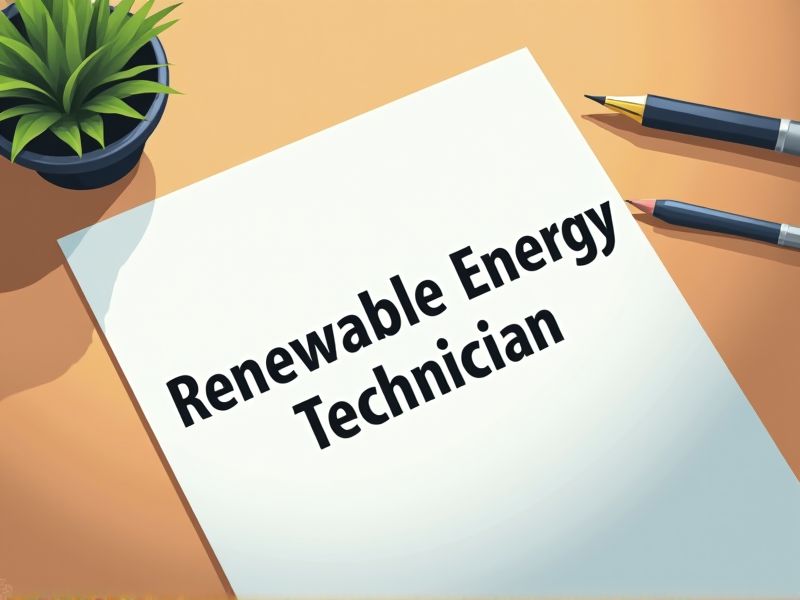
Renewable energy technicians work with technologies that require specialized skills for safety and efficiency. Certifications establish a standard of knowledge and competence necessary to handle complex systems like solar panels and wind turbines. Employers prioritize certified technicians, ensuring adherence to industry regulations and reducing project risks. Essential certifications for a renewable energy technician include those related to photovoltaic systems and wind energy technology.
NABCEP PV Installation Professional Certification
The NABCEP PV Installation Professional Certification establishes a standardized benchmark, which enhances a technician's credibility and employability in the renewable energy sector. Certification ensures that the technician possesses the necessary skills and knowledge to safely and efficiently install photovoltaic systems, which reduces the likelihood of errors and safety concerns. Employers and customers are more inclined to trust certified professionals, leading to increased job opportunities and project contracts. Many jurisdictions and incentive programs may require or favor certified installers, providing a financial and regulatory edge in the marketplace.
NABCEP PV Design Specialist Certification
The NABCEP PV Design Specialist Certification enhances a Renewable Energy Technician's credibility in photovoltaic system design, increasing trust with clients and employers. It provides standardized benchmarks for technical proficiency, ensuring a technician's designs meet industry standards and safety protocols. Demand for certified professionals often leads to better job opportunities and potential for higher earnings. Ongoing certification requirements ensure that technicians remain updated with technological advancements and regulatory changes in the solar energy sector.
OSHA 10-Hour Construction Safety Certification
The OSHA 10-Hour Construction Safety Certification equips renewable energy technicians with essential knowledge of workplace hazards, thereby reducing the risk of accidents in construction environments. As renewable energy projects often involve construction, understanding safety protocols ensures compliance with federal safety regulations. Technicians with certification can also contribute to creating a safer job site, enhancing overall team efficiency. The certification enhances employment prospects by demonstrating a commitment to safety and industry best practices.
OSHA 30-Hour Construction Safety Certification
The OSHA 30-Hour Construction Safety Certification is important for renewable energy technicians because it provides comprehensive safety training specific to construction sites, helping to prevent workplace accidents. With the renewable energy sector growing rapidly, technicians often work at heights and with heavy equipment, increasing the potential risk for injury. This certification ensures technicians are well-versed in identifying and mitigating hazards, fostering a safer working environment. Employers often require this certification to comply with safety regulations, reducing liability and enhancing overall project safety.
LEED Green Associate Certification
Having LEED Green Associate Certification enhances a Renewable Energy Technician's understanding of sustainable building practices, which integrates renewable energy solutions with energy-efficient design. This certification provides credibility and showcases a technician's commitment to environmental stewardship and green building principles. It opens up more job opportunities within the green construction sector, as employers often seek professionals with LEED accreditation. Professionals with this certification can effectively contribute to projects aiming for LEED certification, increasing the project's marketability and compliance with sustainability standards.
Certified Energy Manager (CEM) Certification
The Certified Energy Manager (CEM) certification equips Renewable Energy Technicians with a comprehensive understanding of energy efficiency and optimization strategies, facilitating better project outcomes. Holding a CEM credential enhances credibility and signals a technician's commitment to industry standards, which is essential in a competitive job market. The certification provides access to a network of energy professionals, fostering opportunities for collaboration and knowledge exchange. Employers value CEM-certified technicians for their proven expertise in implementing cost-effective, sustainable energy solutions.
Certified Renewable Energy Professional (REP) Certification
The Certified Renewable Energy Professional (REP) certification ensures that a renewable energy technician possesses a comprehensive understanding of industry standards and practices. Having this certification often results in enhanced job opportunities because it signals a commitment to maintaining high competency in the rapidly evolving energy sector. The REP certification encourages adherence to the most current and effective technologies and methodologies, resulting in improved project outcomes. Employers tend to trust certified individuals more, which can lead to increased responsibilities and career advancement.
NFPA 70E Electrical Safety Certification
NFPA 70E Electrical Safety Certification equips renewable energy technicians with essential knowledge to prevent electrical hazards, a critical concern in renewable energy systems. The certification reinforces adherence to safety standards, reducing the risk of electrical accidents that could result in injuries or fatalities. Employers in the renewable energy sector value this certification as it demonstrates a technician's commitment to maintaining a safe working environment. Solar and wind energy installations involve complex electrical components; having certified technicians ensures compliance with industry safety regulations and enhances overall operational reliability.
Building Performance Institute (BPI) Building Analyst Certification
Having a BPI Building Analyst Certification enables a renewable energy technician to thoroughly assess a building's energy efficiency and identify areas for improvement. This expertise is crucial because optimizing energy efficiency directly influences the effectiveness of renewable energy systems. The certification provides standardized knowledge of building science, enabling technicians to make evidence-based decisions regarding energy-saving measures. Installing renewable systems without considering building performance may lead to suboptimal energy savings and inefficient system integration.
Solar Energy International (SEI) Solar PV Certification
Earning a Solar PV Certification from Solar Energy International (SEI) enhances a technician's credibility in the renewable energy sector due to SEI's recognized expertise in solar education. Certification ensures that technicians are equipped with the latest knowledge and skills, improving the quality and safety of solar energy installations. Employers in the renewable industry often prefer certified professionals, which can lead to better job prospects and career advancement. As solar technology evolves, SEI's certification helps technicians stay current with industry standards and innovations, which is crucial for both personal and professional development.
Summary
When you obtain certifications as a Renewable Energy Technician, your job prospects significantly improve due to a demonstration of specialized skills and knowledge. Certified individuals often experience increased job security as employers prefer validated expertise. Certifications can lead to higher earning potential by distinguishing you as a qualified candidate. Having official credentials may also open doors to advanced positions and diverse opportunities within the renewable energy sector.
